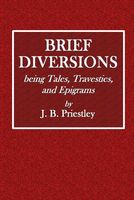- Welcome to FictionDB, Guest
- | My Account
- | Help

Brief Diversions — J.B. Priestley
THE ART OF PARODY.
I suppose most schoolboys with early leanings towards verse-writing begin by essaying the gentle art of parody. In my time a favourite subject was Hiawatha; the meter was so simple-almost any remark might be turned by those who had a slight acquaintance with the juggling of words (as in Latin elegiac writing, for instance ) into Hiawatha meter. And there was no trouble with rhymes, a most important point. Not that we achieved anything beyond a sort of doggerel screed; but we thought it was fine stuff, and for our tender years perhaps it was not so bad-some of it.
It is a curious sidelight upon the workings of the human intelligence how in literary effort so many first turn their hands to attempt the most difficult forms of writing. Take the short story. Every literary agent tells the painful tale of the loaded post-bag, full of the most impossible documents, among which the wheat is very, very hard to find. So many hundreds of thousands of people appear to think themselves blessed with the gift of short-story writing-and promptly commit to paper arrant nonsense. It seems so easy, though in reality it is a deal less difficult to write a passably readable novel.
Just so with parody-and the proof lies partly in the small number of volumes of parody that find their way out of publishers' offices. I say partly, because this paucity is no doubt also due to the lack of public appreciation of this kind of writing. It is, therefore, with all the greater pleasure that one welcomes Mr. J. B. Priestley's delightful little book, "Brief Diversions." Not only does he tackle the poets and the poetasters in elegant form, but he has a most effective tilt at some of our most distinguished prose-writers, including Sir Arthur Quiller-Couch, whose lecture " not yet written" on " The Direct Method " (to be included afterwards in the "Art of Learning") all who have sat at the feet of "Q" will thoroughly appreciate.
According to the author's prefatory note most of the Tales with which the book opens were written while he was in Flanders. "I imagined I was doing something new," he writes, "being either ignorant or forgetful of the work of better men, such as Lord Dunsany and Mr. T. W. H. Crosland, in very similar form. To such gentlemen I can only offer an apology if I seem to enter their little pleasances and tread clumsily where they who went before me stepped so lightly and delicately." One is tempted to think that even this is a piece of subtle "leg-pulling" on Mr. Priestley's part. Whatever be the truth of it the Tales are most lightly, delicately and quite admirably written. "Brief Diversions" is a slender volume. I shall look forward with pleasurable anticipation to this young author's next venture.
-"Bookman's Journal," Vol. 5
I suppose most schoolboys with early leanings towards verse-writing begin by essaying the gentle art of parody. In my time a favourite subject was Hiawatha; the meter was so simple-almost any remark might be turned by those who had a slight acquaintance with the juggling of words (as in Latin elegiac writing, for instance ) into Hiawatha meter. And there was no trouble with rhymes, a most important point. Not that we achieved anything beyond a sort of doggerel screed; but we thought it was fine stuff, and for our tender years perhaps it was not so bad-some of it.
It is a curious sidelight upon the workings of the human intelligence how in literary effort so many first turn their hands to attempt the most difficult forms of writing. Take the short story. Every literary agent tells the painful tale of the loaded post-bag, full of the most impossible documents, among which the wheat is very, very hard to find. So many hundreds of thousands of people appear to think themselves blessed with the gift of short-story writing-and promptly commit to paper arrant nonsense. It seems so easy, though in reality it is a deal less difficult to write a passably readable novel.
Just so with parody-and the proof lies partly in the small number of volumes of parody that find their way out of publishers' offices. I say partly, because this paucity is no doubt also due to the lack of public appreciation of this kind of writing. It is, therefore, with all the greater pleasure that one welcomes Mr. J. B. Priestley's delightful little book, "Brief Diversions." Not only does he tackle the poets and the poetasters in elegant form, but he has a most effective tilt at some of our most distinguished prose-writers, including Sir Arthur Quiller-Couch, whose lecture " not yet written" on " The Direct Method " (to be included afterwards in the "Art of Learning") all who have sat at the feet of "Q" will thoroughly appreciate.
According to the author's prefatory note most of the Tales with which the book opens were written while he was in Flanders. "I imagined I was doing something new," he writes, "being either ignorant or forgetful of the work of better men, such as Lord Dunsany and Mr. T. W. H. Crosland, in very similar form. To such gentlemen I can only offer an apology if I seem to enter their little pleasances and tread clumsily where they who went before me stepped so lightly and delicately." One is tempted to think that even this is a piece of subtle "leg-pulling" on Mr. Priestley's part. Whatever be the truth of it the Tales are most lightly, delicately and quite admirably written. "Brief Diversions" is a slender volume. I shall look forward with pleasurable anticipation to this young author's next venture.
-"Bookman's Journal," Vol. 5
Click on any of the links above to see more books like this one.

